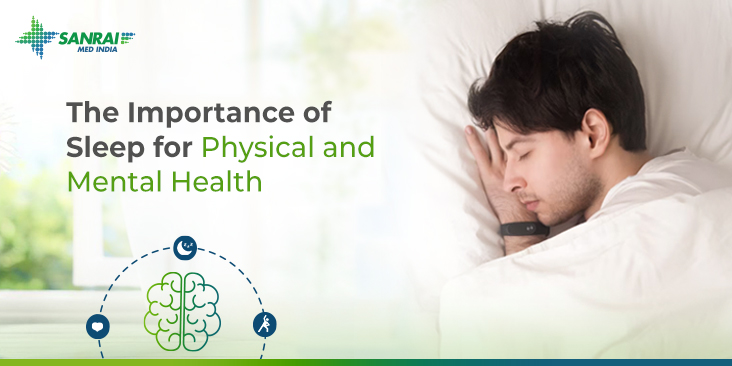The Importance of Sleep And How to Improve Sleep Quality
Sleep is crucial for overall health and well-being. Improving sleep quality enhances mood, productivity, and physical health.
Adequate sleep is vital for maintaining mental and physical health. Poor sleep can lead to numerous issues such as decreased cognitive function, mood swings, and weakened immunity. Establishing a regular sleep schedule and creating a peaceful sleep environment can significantly improve sleep quality.
Reducing screen time before bed and avoiding caffeine in the evening are also beneficial. Practices like meditation and deep-breathing exercises can promote relaxation, making it easier to fall asleep. Prioritizing sleep and implementing these strategies can lead to a healthier, more balanced life. Remember, good sleep is not a luxury; it is a necessity for optimal health.

Credit: cpap.parts
Benefits Of Quality Sleep
Understanding the benefits of quality sleep is crucial. Quality sleep impacts various aspects of our lives, from physical health to mental well-being. Let’s delve into how good sleep can transform your life.
Physical Health
Quality sleep is vital for maintaining physical health. When you sleep well, your body repairs itself. This includes muscle recovery, tissue growth, and cell repair. A good night’s sleep boosts your immune system, making you less prone to illnesses. It also helps maintain a healthy weight by regulating hormones that control hunger and fullness.
- Muscle recovery and growth
- Boosted immune system
- Regulated hunger hormones
Studies show that people who sleep well have a lower risk of chronic diseases. These include heart disease, diabetes, and obesity. Good sleep also helps maintain healthy blood pressure levels.
| Health Benefit | Description |
|---|---|
| Heart Health | Reduces the risk of heart disease |
| Diabetes Management | Regulates blood sugar levels |
| Weight Management | Helps control appetite and weight |
Mental Well-being
Quality sleep is essential for mental well-being. It enhances cognitive functions such as memory, concentration, and decision-making. When you sleep well, you wake up feeling refreshed and alert. This improves your ability to focus and be productive throughout the day.
- Improved memory
- Better concentration
- Enhanced decision-making skills
Good sleep also helps regulate your emotions. It reduces stress and anxiety levels. This leads to a happier and more balanced mood. Poor sleep, on the other hand, can lead to mood swings, irritability, and even depression.
In summary, quality sleep is a cornerstone of a healthy, happy life. Prioritizing good sleep can bring about significant improvements in both physical and mental health.
:max_bytes(150000):strip_icc()/how-to-get-better-sleep-5094084-regular-FINAL-2c371001cada4ad391f6de53fc6053c9.png)
Credit: www.verywellmind.com
Common Sleep Disorders
Sleep is crucial for our health. But many people face sleep disorders. These disorders can affect the quality of life. Here, we will discuss some common sleep disorders.
Insomnia
Insomnia is a common sleep disorder. It makes it hard to fall asleep or stay asleep. People with insomnia often feel tired during the day.
Common causes of insomnia include:
- Stress
- Anxiety
- Depression
- Poor sleep habits
- Medical conditions
- Caffeine or alcohol use
Improving sleep hygiene can help. Here are some tips:
- Stick to a sleep schedule
- Create a restful environment
- Limit screen time before bed
- Avoid large meals and caffeine late in the day
Sleep Apnea
Sleep apnea is another common sleep disorder. It causes breathing to stop and start during sleep. This disrupts sleep and can lead to other health problems.
There are two main types of sleep apnea:
- Obstructive sleep apnea (OSA): The throat muscles relax too much
- Central sleep apnea (CSA): The brain doesn’t send proper signals to the muscles
Common symptoms of sleep apnea include:
- Loud snoring
- Gasping for air during sleep
- Morning headache
- Difficulty staying asleep
- Excessive daytime sleepiness
Treatment options for sleep apnea include:
- Continuous Positive Airway Pressure (CPAP) therapy
- Oral appliances
- Lifestyle changes such as weight loss
- Surgery in severe cases
Consult a healthcare provider for proper diagnosis and treatment.
Impact Of Poor Sleep
Poor sleep impacts our daily lives in several ways. It affects our brain, mood, and body functions. Understanding the impact of poor sleep can help us improve our sleep quality.
Cognitive Function
Insufficient sleep can harm our cognitive function. We may struggle to concentrate or remember things. This affects our ability to learn and make decisions. Tasks that need attention become harder. A tired brain works slower and less efficiently.
- Memory problems
- Difficulty focusing
- Slower reaction times
- Poor decision-making
Emotional Stability
Lack of sleep impacts our emotional stability. We become more irritable and less patient. Little things can make us upset. Our mood swings more often. We may feel more stressed and anxious. Emotional control becomes a challenge.
- Increased irritability
- Mood swings
- Higher stress levels
- Anxiety and depression
Understanding these impacts can motivate us to improve our sleep habits. Quality sleep supports a healthy brain and stable emotions.
Healthy Sleep Habits
Creating healthy sleep habits can significantly improve sleep quality. Good sleep is essential for mental and physical health. Below are some tips to help you develop better sleep habits.
Consistent Schedule
Maintaining a consistent sleep schedule helps regulate your body’s internal clock. Go to bed and wake up at the same time every day. This includes weekends. A regular schedule makes it easier to fall asleep and wake up.
Bedtime Routine
A relaxing bedtime routine can signal your body that it’s time to sleep. Consider activities like:
- Reading a book
- Taking a warm bath
- Listening to calming music
Avoid screens before bed. The blue light from phones and tablets can keep you awake. Instead, opt for activities that help you wind down.
| Activity | Effect |
|---|---|
| Reading | Relaxes the mind |
| Warm Bath | Relaxes the body |
| Calming Music | Soothes the senses |
By incorporating these healthy sleep habits, you can enhance your sleep quality. Consistency and routine are key to a restful night’s sleep.
Diet And Sleep
What you eat affects how well you sleep. Your food choices can help or hurt your sleep quality. Let’s see which foods to avoid and which to eat for better sleep.
Foods To Avoid
Avoiding certain foods can help you sleep better. Here is a list of foods to steer clear of before bedtime:
- Caffeine: Coffee, tea, and some sodas have caffeine. Caffeine keeps you awake.
- Spicy Foods: Spicy foods can cause heartburn. Heartburn can keep you up at night.
- Fatty Foods: Fast food and fried foods can disrupt your sleep.
- Alcohol: Alcohol may make you sleepy. But it can disrupt your sleep cycle.
- Chocolate: Chocolate contains caffeine. It can keep you awake.
Beneficial Foods
Some foods help you sleep better. Here are some foods that can improve your sleep quality:
- Almonds: Almonds have magnesium. Magnesium helps you relax.
- Kiwi: Kiwi contains serotonin. Serotonin helps regulate sleep.
- Chamomile Tea: Chamomile tea has antioxidants. Antioxidants help improve sleep quality.
- Milk: Milk contains tryptophan. Tryptophan helps produce melatonin, a sleep hormone.
- Bananas: Bananas have potassium and magnesium. Both help relax muscles.
Here is a simple table for quick reference:
| Foods to Avoid | Beneficial Foods |
|---|---|
| Caffeine | Almonds |
| Spicy Foods | Kiwi |
| Fatty Foods | Chamomile Tea |
| Alcohol | Milk |
| Chocolate | Bananas |
Sleep Environment
A good sleep environment is crucial for quality sleep. It can affect how quickly you fall asleep and how well you stay asleep. Here are some tips to improve your sleep environment.
Comfortable Bedding
Your bed should be your sanctuary. Invest in a good mattress that supports your body. A quality mattress can reduce back pain and improve sleep.
Pillows also matter. Choose a pillow that keeps your neck aligned. This can prevent neck pain and improve sleep quality.
Bedding materials are important too. Use breathable fabrics like cotton. They keep you cool and comfortable throughout the night.
| Item | Importance |
|---|---|
| Mattress | Supports your body |
| Pillows | Neck alignment |
| Bedding | Breathable and comfortable |
Room Ambiance
The ambiance of your room can significantly impact your sleep. Keep your room cool and dark. A cooler room helps your body relax and fall asleep.
Use blackout curtains to block light. Light can disrupt your sleep cycle and make it hard to fall asleep.
Reduce noise in your room. Use earplugs or a white noise machine to block out sounds. This can help you stay asleep throughout the night.
- Cool temperature
- Dark room
- Quiet environment
Add a calming scent like lavender. Aromatherapy can help you relax and prepare for sleep.
Keep electronic devices out of the bedroom. The blue light from screens can disrupt your sleep cycle. Try reading a book instead of using your phone before bed.
- Use blackout curtains
- Reduce noise
- Avoid screens before bed
Technology And Sleep
In today’s digital age, technology impacts sleep quality. Many people use devices before bed. This can disrupt sleep patterns. Understanding how technology affects sleep is important.
Screen Time
People often use phones or tablets before bed. This increases screen time. Longer screen time can lead to poor sleep. The brain stays active, making it hard to relax.
Avoid using screens at least one hour before bedtime. Create a bedtime routine without devices. This helps the mind to unwind.
Blue Light Exposure
Electronic devices emit blue light. Blue light can affect sleep quality. It tricks the brain into thinking it is daytime.
Consider using blue light filters on devices. These filters reduce blue light exposure. Another option is wearing blue light blocking glasses. These can help maintain melatonin levels in the body.
Make bedrooms a screen-free zone. Use warm, dim lighting in the evening. This prepares the body for sleep.
| Tips | Actions |
|---|---|
| Reduce Screen Time | Avoid devices 1 hour before bed |
| Use Blue Light Filters | Enable filters on devices |
| Wear Blue Light Glasses | Wear in the evening |
| Create a Screen-Free Zone | Keep devices out of the bedroom |

Credit: www.thensf.org
Relaxation Techniques
Quality sleep is essential for good health. Relaxation techniques can help improve sleep quality. These methods calm your mind and body before bedtime. Let’s explore some effective relaxation techniques.
Meditation
Meditation involves focusing your mind on a single point. This practice can reduce stress and promote relaxation. Regular meditation can help you fall asleep faster.
To meditate:
- Find a quiet, comfortable place.
- Sit or lie down in a relaxed position.
- Close your eyes and breathe deeply.
- Focus on your breath or a calming word.
- Allow thoughts to pass without engagement.
Start with a few minutes daily. Gradually increase the time as you get comfortable.
Breathing Exercises
Breathing exercises can help calm your mind. These exercises slow your heart rate and relax your muscles. They are simple and can be done anywhere.
Try the 4-7-8 Breathing Technique:
- Inhale deeply through your nose for 4 seconds.
- Hold your breath for 7 seconds.
- Exhale slowly through your mouth for 8 seconds.
- Repeat this cycle four times.
This technique can help you feel more relaxed and ready for sleep.
Other breathing exercises include:
- Box Breathing: Inhale for 4 seconds, hold for 4, exhale for 4, hold for 4.
- Diaphragmatic Breathing: Breathe deeply into your belly, not your chest.
These exercises can be practiced any time you need to relax.
Conclusion
Achieving quality sleep is vital for overall health and well-being. Prioritize a consistent sleep schedule and a calming bedtime routine. Limit screen time and caffeine intake before bed. These simple steps can significantly improve your sleep quality. Invest in your sleep to reap lifelong benefits for both body and mind.







